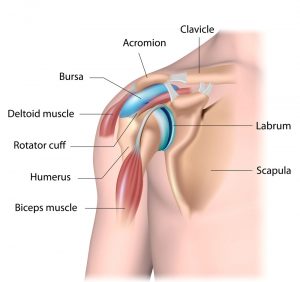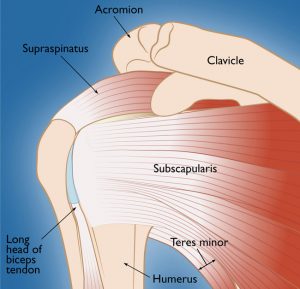Shoulder injuries are common because of how frequently the area’s utilized in day-to-day life and how many joints are involved. We often think of our shoulder as one unified area of our arm, but it is actually made up of many different muscles and tendons. These factors make it particularly vulnerable to injury. Because of the many structures it can often be difficult to pinpoint exactly which part is injured. If you are experiencing shoulder pain and aren’t sure what’s causing it, here are examples of common shoulder injuries.
Understanding Anatomy
Before trying to determine the category of injury, it is first necessary to understand the anatomy of your shoulder. It is comprised of three different bones: upper arm bone (humerus), shoulder blade (scapula), and collarbone (clavicle). The rotator cuff secures your arm within the socket of your shoulder. It also maintains fluid movement with the help of a lubricating sac called the bursa. The bursa is located in between the top of your shoulder (acromion) and the rotator cuff. All of these elements need to work together for you to fully use of your arms without feeling any pain.
Impingement Syndrome
Often referred to as “swimmer’s shoulder” or “thrower’s shoulder,” impingement syndrome happens when the acromion rubs against the tendon and the bursa, resulting in painful irritation. This injury often appears in athletes who participate in tennis, baseball, and swimming. It can also affect individuals whose jobs require repetitive lifting or keeping their arms overhead for lengthy segments of time.
One common symptom of impingement syndrome is experiencing pain in the shoulder while doing activities that include overhead movement, such as reaching, throwing, or swimming. The type of pain associated with impingement syndrome is more dull than sharp and often lingers which can lead to difficulty sleeping at night.
Frozen Shoulder
Frozen shoulder is named for the freezing of mobility and overall stiffness that affected individuals experience. This feeling is caused by the thickening and tightening of the shoulder capsule which, if left untreated, can lead to the development of stiff bands of tissue called adhesions. The pain is usually a dull and aching variety and is enhanced whenever the arm is moving.
Adhesive capsulitis, or frozen shoulder, can be a consequence of a specific injury or it can be linked to diseases like diabetes, or hypothyroidism. It can also occur as a result of long-term immobilization due to surgery, or another kind of injury that would inhibit any arm movement.
 Rotator Cuff Tear
Rotator Cuff Tear
Injuries to the rotator cuff are very common. According to the American Academy of Orthopedic Surgeons, in 2013 almost 2 million people in the U.S. went to their doctor because of a rotator cuff issue. If you’re having pain in your rotator cuff it can greatly inhibit your ability to carry out even minor tasks.
There are multiple ways that a rotator cuff can be torn. An acute injury would happen as the result of one specific event such as lifting a heavy object improperly. More commonly, rotator cuff tears happen over time as a consequence of the tendons wearing down. This can be caused by repetitive stress in terms of constant and repeated movements, or sometimes due to lack of blood supply which happens more frequently as we grow older.
Just because these shoulder injuries are common does not mean that you should have to endure the pain they cause. There are many options available for healing. For those of you living in the Louisville area, Dr. Stacie Grossfeld is an expert orthopedic surgeon with years of experience treating patients who have sustained shoulder injuries. She specializes in shoulder reconstruction, arthroscopic rotator cuff repairs, as well as sports medicine. If you’re in pain, or struggling to maintain mobility in your arms and shoulders, don’t hesitate to ask for help. Call our offices at (502) 212-2663 to set up an appointment today!

Recent Comments